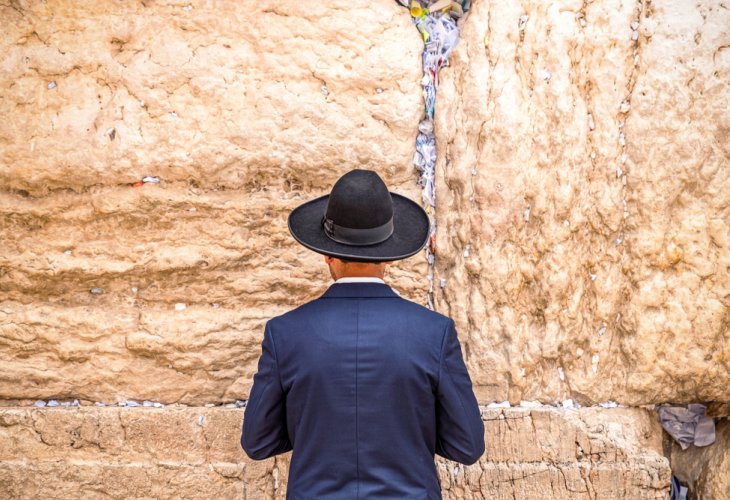Faith
Signs of Genuine Faith: How to Recognize and Build True Trust in God
A practical guide to identifying, testing, and strengthening your trust in God through everyday challenges
 (Photo: shutterstock)
(Photo: shutterstock)Many people who feel calm and unafraid, attribute this to their trust in God, when in fact it stems from self-reliance. There are various ways a person can test whether they truly trust in God. Below are several such “tests,” along with the benefits of trust in serving God, as described in Chovot HaLevavot (Duties of the Heart), Gate of Trust, and other sacred works.
Practical, Day-to-Day Tests of Faith
Test 1: Inner calm without dependence on circumstances
Chovot HaLevavot (Gate of Trust, ch. 1) writes: “The one who trusts in God has peace of mind, free from worries, allowing him to devote himself to serving God.” One should check if they remain equally calm and composed with or without material means. Do they stay at peace even if, God forbid, a doctor gives no hope for their recovery, or if their source of income is cut off? True trust means remaining as tranquil without the means as with them.
Test 2: Independence from people’s approval
A true believer is not dependent on others, does not look to them for help, and does not try to seek their favor. They will not flatter people, agree with them in matters against God’s service, fear them, or hesitate to rebuke them when necessary.
Test 3: Contentment with one’s lot
A real trust in God means being satisfied with what one has and not constantly striving to increase wealth. Such a person understands that only minimal effort is needed for God’s blessing to rest upon them. Overexertion proves dependence on worldly causes and fear that without them one’s income will shrink.
Test 4: Anger
When something happens against one’s will, check whether it triggers anger. Strong trust in God means believing that even without the apparent cause, nothing one truly needs will be lacking and there is therefore no reason for anger. Our sages said, “One who becomes angry is as if they served idolatry,” because idolatry denies that all is from God. Anger shows belief in chance and human causes and God therefore rebuked Jacob for saying to his sons, “Why did you bring this trouble on me?” (Genesis 43:6), as if they — not God, had caused Benjamin to be taken to Egypt.
Test 5: Envy
When hearing good news about someone else, does one feel joy or resentment? When hearing of another’s misfortune, especially a rival, does one feel satisfaction or sadness? Authentic trust means knowing that no one can take what God has decreed for another, nor can one acquire what Heaven has not allotted. Envy is essentially heresy, implying dissatisfaction with God’s plan.
Test 6: Pride
Our sages taught: “One who is arrogant is as if they deny the fundamental principle and serve idolatry.” Pride is a result of attributing success to one’s own power — “My strength and the might of my hand made me this wealth”, rather than to the living God.
Test 7: Torah and prayer
One who trusts God will not cancel Torah study or prayer for business opportunities. They believe no loss can come from missing a deal for the sake of Torah and prayer; on the contrary, God will provide from another source, even more than before.
Test 8: Expenses for mitzvot
Such a person does not hold back from spending for Shabbat needs, children’s Torah education, charity, and similar purposes, knowing these expenses are not deducted from one’s yearly allotment.
Test 9: Gratitude
A sign of trust is thanking God for every blessing. Failure to thank Him shows one attributes success to personal effort. As Kav HaYashar notes that if we thank a friend for even small favors, how much more so should we thank God for every profit and good that comes our way.
Test 10: Rejecting fortune-tellers and superstition
A true believer avoids and even despises sorcerers, astrologers, palm readers, and face readers, especially the frauds so common today. Besides the severe prohibition of consulting them, doing so undermines pure faith. As the Torah commands (Deuteronomy 18:13): “Be wholehearted with the Lord your God.” A believer turns only to God in prayer and is not afraid of any magic or plots, knowing they too are under His decree. With faith in God, one can break all spells and schemes so they cannot harm, and even if they have taken effect, they will vanish. (Nefesh HaChaim III:12 explains this at length.)
Test 11: Education and marriage choices
One who believes livelihood comes from God will not hesitate to send their children to Torah schools and yeshivot, nor will they fear for their children’s future livelihood. Likewise, they will gladly give their daughter to a God-fearing Torah scholar without worrying about her financial future, trusting in the verse: “I have never seen the righteous forsaken or his children begging for bread” (Psalms 37:25).

